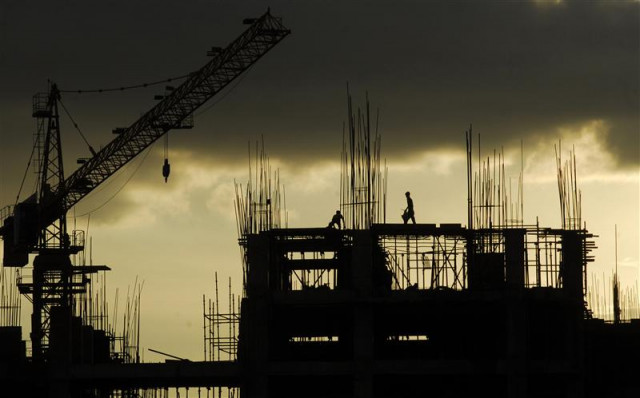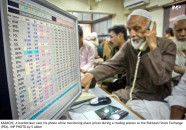Infrastructure and economic development – a flawed debate
Govt needs to focus on governance to ensure sustainability of mega projects.

Labourers work at a construction site. PHOTO: REUTERS
However, research and international experience indicate that basic infrastructure – and its quality – is a strong determinant of economic growth and social prosperity.
Trade-offs between education — or other social services – and physical infrastructure are frequently presented in mainstream and social media without realising that both are needed.
Infrastructure and education – and other social development goals – are not mutually exclusive. A reliable and a safe public transport system in cities, for example, can have a phenomenal impact on girl’s education, health care visits, women employment and overall labour force mobility.
On the other side, the advocates of infrastructure propagate any kind of brick-and-mortar activity as the game changer. Hence, the debate on the contribution and role of infrastructure is severely flawed in Pakistan.
Pakistan's GDP growth rate is even higher than that of China: Harvard study
Most of the developed countries invested in infrastructure during the middle of 19th and the start of 20th century when their per capita income was less than $1,000 and literacy rates were around 50%. London and American cities had underground transport systems in the 19th and early years of the 20th century.
Now, the annual number of passengers travelling through subways and metros of New York, London and Tokyo is 1.8 billion, 1.2 billion and 9 million respectively. The inter-state highway system of the US was one of the main contributors to economic development in the second half of the 20th century.
Yes, the infrastructure projects were not limited to roads and transport. Water and sewerage system helped tremendously to improve the quality of life, health, and human productivity in the developed world.
The importance of complementarity between infrastructure and social services was well stated by former US president Barack Obama in his inaugural address in 2013.
“Together, we determined that a modern economy requires railroads and highways to speed travel and commerce, schools and colleges to train our workers….Together, we resolved that a great nation must care for the vulnerable, and protect its people from life’s worst hazards and misfortune,” he said.
Transparency
When the importance of infrastructure is emphasised for economic growth, it does not mean that there should not be a discussion on the design, approach, viability and location of such projects.
Governments will have to be transparent, efficient and inclusive in these areas. Corruption scandals in infrastructure projects appear in the media every day and thus, many advocate the government should focus more on education and health.
It is important to understand that the weak state capacity that inhibits the execution of infrastructure projects transparently and efficiently, also hinders the achievement of goals in the areas of education and health.
Furthermore, there has been a renewed focus on infrastructure projects recently, but little attention has been paid to the governance of infrastructure. Even if we succeed in developing state-of-the-art infrastructure in some areas, the weak governance capability will hinder the maintenance and operations of the same infrastructure.
Look at the quality of current operations of railways, electricity, roads, airports, and water/sewerage systems. Almost 50% of the water and sanitation schemes are dysfunctional in Pakistan. The recovery rate of water bills, despite being nominal, is lower than 50%. The aviation sector is performing sub-optimally.
Pakistan is now a $300-billion economy
Circular debt has been choking the supply of electricity for quite some time despite massive undue injection of public money. Hospitals and healthcare facilities, especially in rural areas, are in a poor state.
Most of these sectors are suffering due to inadequate maintenance of infrastructure and weak governance capability.
Lack of quality research
Many of Pakistan’s universities and scientific research centres have modern machinery and equipment, but they are unable to produce quality research due to constraints in the areas of governance and culture.
The public-private partnership is now gaining traction for infrastructure development in many sectors. However, Pakistan’s recent performance in private partnership is yielding sub-optimal results due to weaknesses in the institutional architecture.
In the railway sector, for example, not every route and operation should be privatised, but privatising some commercial routes and freight transfer can help a lot.
Densely populated areas in central Punjab can benefit from regional train operations, managed by the private sector. Imagine the mobility and social gains of multiple short trains (by the private sector) on busy routes such as Faisalabad-Lahore, Gujranwala-Lahore, Okara-Lahore, Islamabad-Peshawar and Hyderabad-Karachi.
Similarly, there is a need to enhance the number of private-sector freight trains. All these routes will prove self-sufficient. However, the routes in strategic and less-developed regions can and should be subsidised by the government.
Many of these efforts have failed in Pakistan Railways because the current institutional structure does not support such innovative and dynamic solutions. The current government has succeeded in improving the operation of Pakistan Railways, but there is a need to address institutional bottlenecks to put the railway sector on the track on a sustainable basis.
In the end, I would argue that we need to have the right approach, theoretically and statistically, to discuss linkages between infrastructure and economic development. We need both physical infrastructure and interventions in the social sector.
The key area to be discussed further is the governance capability of the state to improve service delivery through quality interventions in both physical infrastructure and social sector.
The writer is a public policy practitioner and researcher
Published in The Express Tribune, August 21st, 2017.
Like Business on Facebook, follow @TribuneBiz on Twitter to stay informed and join in the conversation.


















COMMENTS
Comments are moderated and generally will be posted if they are on-topic and not abusive.
For more information, please see our Comments FAQ